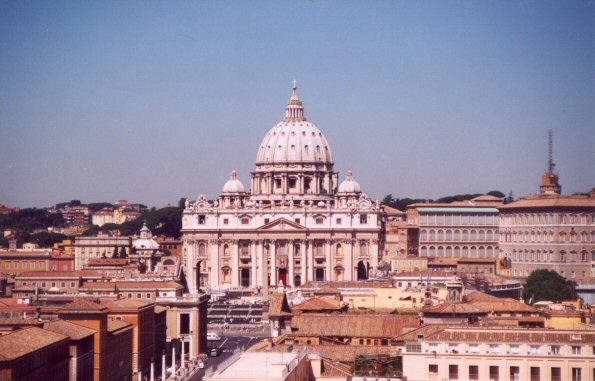
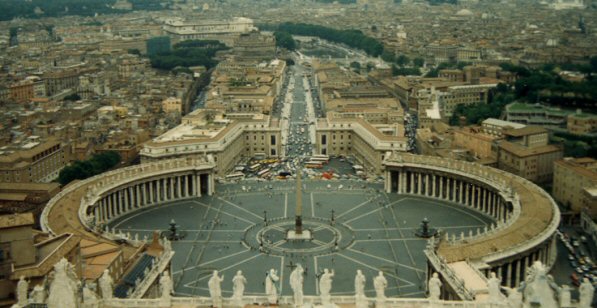
This Is
The Mass.com
Introduction & Liturgical Year
Cycle B 2023-2024
Mass Thoughts
Index
Introduction
Man is naturally curious. His intellect leads
him to seek answers about himself, his world, and his purpose on
earth. Early man attributed events in his world to the
workings of beings more powerful than he, but believed they
would favor him when he offered something which he held
dear. The farmer offered some of his best grain, the
shepherd the strongest and most promising animal. Some
went so far as to sacrifice their first-born child or even an
adult family member to insure an imagined successful
endeavor. In time, and to a particular people, God
revealed that only one God existed, and to them a savior would
be sent to dwell among them who would personify God's love.
The prophet Isaiah, who spoke God's messages named the savior Immanuel, which means God with us. Later, Jesus Christ, born of a virgin entered the world, as was prophesied, with the Good News that God's kingdom was for everyone. This Christ, the anointed one, claimed and proved He was divine, gathered an inner circle of followers, commissioned them to teach all nations, and assured them the Holy Spirit would guide them without error in matters of faith and morals. His message was not accepted by the jealous religious leaders of that time who killed Him out of envy. By his death, He redeemed all men from the penalty of the Original Sin, and won for them the opportunity to enter into the eternal vision of God. Being God, He rose from the dead and ascended into heaven.
Jesus Christ instructed His apostles in the exact way He and God the Father should be glorified. He chose this way in order to dwell and remain in our midst. And so He nourishes and strengthens us to make choices which are in accordance with His teaching and pleasing to Him. The apostles were formed by Him into His church and given exact directions to memorialize the sacrifice He voluntarily made for our salvation. This is the Sacrifice of the Mass.
The memorial by which we honor Christ was chosen by Him. He was born to sacrifice himself to redeem us from the power of sin; something we could not do for ourselves. The night before He died, He told His apostles directly that the bread was His body and the wine was His blood. Had He not said earlier, "Unless you eat the flesh of the Son of Man and drink of His blood you will not have life within you." (John 6) As a priest, He gave the apostles His own body and blood in the bread and wine, thus offering Himself as the perfect victim to His Father. Then He commissioned them to do the same as a memorial of His love. When Christ instituted the Mass on that Thursday evening, He looked forward to its completion and perfection on Friday. Today when we participate at Mass, we look back to this event.
The sacrifice on Calvary has potentially redeemed everyone who has ever lived and who will live in the world. But, to take advantage of what Christ has done for us, each person must voluntarily accept, nourish and apply the merits and benefits of this sacrifice to himself. The Mass is not a new sacrifice, but a repeated enactment of Christ's supreme sacrifice of Calvary. The merit one gains at the Mass is the same is if we witnessed the actual scene on Calvary. Christ offered the perfect sacrifice for men because He was both the priest who offered the sacrifice to His father and the victim which was offered.
The priest becomes the representative of Christ as he says the words of Christ: "This is my Body, This is my Blood." The bloody sacrifice endured by Christ is now repeated on the altar but in a bloodless manner. Then, Christ died on the cross alone, today we are with Him at the sacrifice of the Mass. The Mass is the projection in time of the eternal values of Calvary.
That is what Christ, the Second Person of the Holy Trinity has done for us. In the Mass, He is both the victim, the one being sacrificed, and the Priest who offers the sacrifice to the Father. By the power given to the Church, the priest offers our gifts of bread and wine, which represent ourselves, to God the Father. We offer ourselves - our weaknesses, and pettiness to God so we can be changed for He is the source of all goodness. The great God in his goodness takes the simple gifts we offer, bread and wine, and changes them to become a gift of Himself, from Himself, to us.
The priest becomes the person of Christ
through whom the bread and wine is offered to God the
Father. As the words which Christ said as He consecrated
the bread and wine at the Last Supper, "This is My Body,
This is My Blood," are repeated by the priest at the
Consecration of the Mass, they no longer remain bread and wine,
but are changed into the Body and Blood of Christ. From
the priest we receive the benefits of our sacrifice - the very
life of God himself. Our poor offerings are changed,
lifted up to an infinitely higher level of being and returned to
us. Christ enters into every fiber of our being and draws
us closer into the love of God the Father.
From the most noble center of Catholic Christendom
in Rome, . . .
St. Peter's Basilica, Rome, Italy


. . . to
the Basilicas of worship throughout the world, . . .
Basilica of the National Shrine of the Immaculate
Conception, Washington, D.C., USA
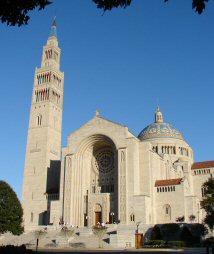
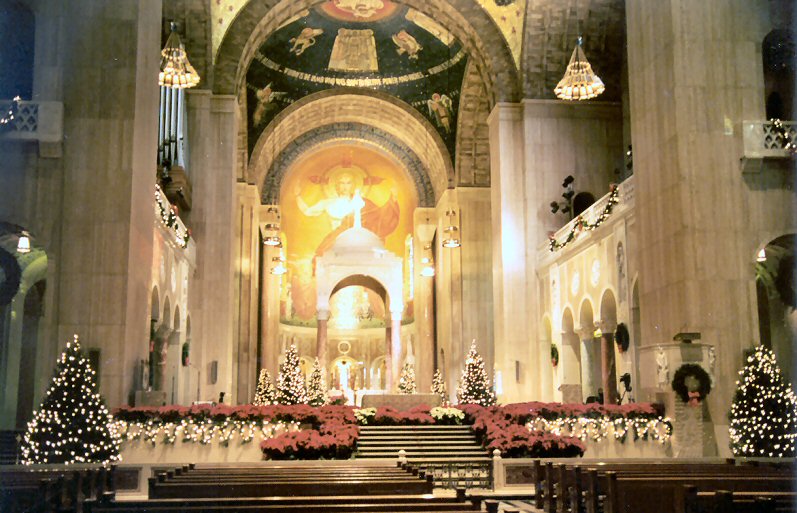
. . . to the most
humble altars located in the distant missionary lands. . . .
South Africa
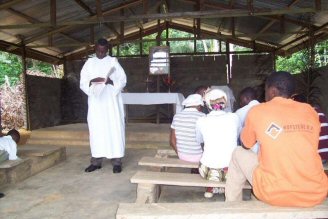
. . .
to dangerous battlefields, . . .
Mt. Suribachi, Iwo Jima, World War II
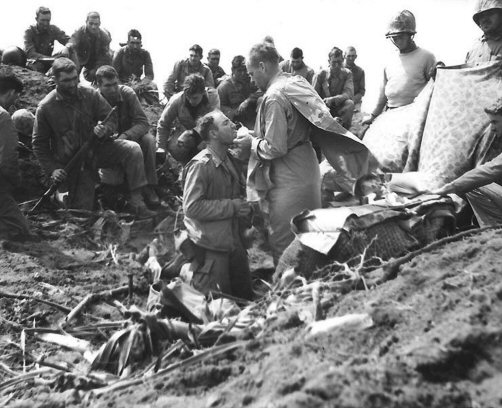
. . . the Mass is the supreme act of worshiping God the
Father through Christ His Son by the Church which He founded.
Liturgical
Church Year Cycles
There is
no higher form of Divine Worship than the Mass. This
public worship by the Church contains scriptural readings and
prayers which are gathered into three cycles. Over the
years, the faithful become familiar with the rich scriptural
heritage which is part of the Christian tradition that
enhances the renewal of God's covenant with man at the
Mass.
The new Church Year cycle begins on the first Sunday in December marking the beginning of Advent which anticipates the coming of Jesus Christ, the Messiah, Redeemer, and Savior whose birth is celebrated on Christmas Day.